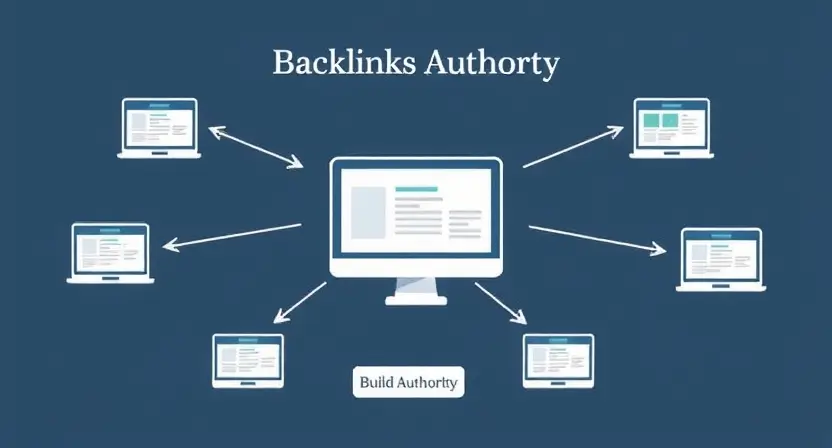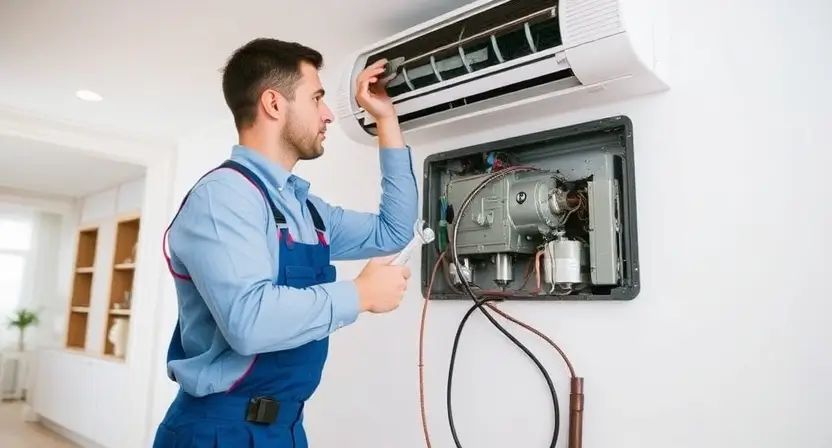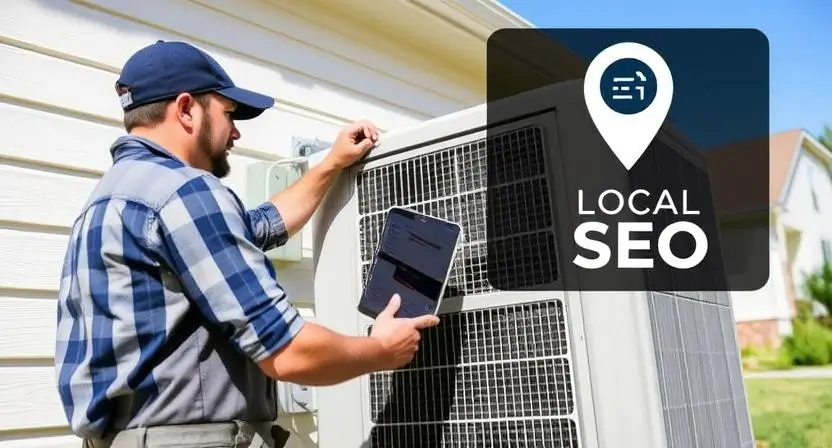If you’re an HVAC contractor looking to attract more customers and grow your business, then SEO strategies are essential to your success. Search Engine Optimization (SEO) helps your business appear in search engine results when potential customers search for HVAC services in your area. However, the world of SEO can be overwhelming, especially when you’re trying to figure out which strategies will work best for your specific needs.

In this blog post, we will break down 10 key SEO strategies for HVAC contractor should implement to boost their online presence, attract more leads, and ultimately grow their business.
1. Keyword Research for HVAC Contractors
The first step in any successful SEO strategy is identifying the right keywords. These are the search terms that potential customers use when searching for HVAC services. For HVAC contractors, these might include phrases like “HVAC repair near me,” “AC installation [Your City],” or “emergency heating services.”
How to Conduct Keyword Research:
- Use Keyword Tools: Tools like Google Keyword Planner, Ubersuggest, and Ahrefs can help you identify popular keywords in the HVAC industry.
- Think Local: Incorporate location-based keywords such as your city, neighborhood, or even ZIP code (e.g., “HVAC repair in [City]”).
- Long-Tail Keywords: Target more specific search terms (like “affordable AC repair in [City]”) to attract customers who are further along in the decision-making process.
By focusing on keywords your potential customers are actually searching for, you can drive high-quality traffic to your website and improve your chances of converting visitors into clients.
Example:
If someone in your area is searching for “AC repair in [City]” and you’ve optimized your site with this keyword, your website will be more likely to appear at the top of the search results.
2. Optimizing Your Google My Business Listing
Google My Business (GMB) is one of the most powerful local SEO tools available for HVAC contractors. When your GMB listing is properly optimized, it can significantly improve your visibility in local search results, including the Google 3-Pack (the top three businesses shown in a local search result).

How to Optimize Your Google My Business Listing:
- Claim Your Listing: If you haven’t already, claim your GMB listing and ensure your business information is accurate and up to date.
- Add Photos: Upload high-quality images of your team, work, and service vehicles to enhance your listing.
- Use Relevant Keywords: Include local keywords in your GMB description and services section.
- Get Reviews: Encourage satisfied customers to leave positive reviews on your GMB listing, as reviews heavily influence local SEO rankings.
Example:
If someone searches for “AC installation in [City]”, having a well-optimized GMB listing with positive reviews can increase the likelihood of your business showing up in the Google 3-Pack, leading to more calls and inquiries.
3. Mobile Optimization for HVAC Websites
With over 60% of searches now coming from mobile devices, it’s more important than ever to have a mobile-friendly website. Google considers mobile optimization as a ranking factor, and a poor mobile experience could hurt your website’s ranking.
How to Optimize Your HVAC Website for Mobile:
- Responsive Design: Ensure your website adjusts seamlessly to any screen size, from phones to tablets to desktop computers.
- Fast Load Times: Mobile users tend to abandon websites that load slowly. Use tools like Google PageSpeed Insights to optimize your website’s load time.
- Clear Contact Info: Make it easy for users to find your phone number and contact information without having to scroll or zoom in.
- Simple Navigation: Keep menus simple and easily accessible, so users can quickly find the information they need.
Example:
A potential customer searching for “emergency HVAC services near me” on their phone should be able to easily click on your website, view your contact details, and call you directly—all without frustration.
4. Content Marketing for HVAC SEO
Content marketing is a powerful tool for boosting SEO. By creating helpful, informative content, you can attract visitors who are searching for HVAC-related information, while also positioning your business as an expert in the field.
How to Create Content for HVAC SEO:
- Blog Posts: Write blog posts that address common HVAC questions, maintenance tips, and troubleshooting advice. Make sure to optimize these posts with relevant keywords.
- Local Content: Create content that is specific to your service areas, such as “How to Prepare Your HVAC System for Winter in [City]”.
- FAQ Pages: Develop a comprehensive FAQ page that answers common customer questions about your services.
Example:
A blog post titled “5 Tips for Saving Money on HVAC Repairs in [City]” can attract local homeowners who are looking to maintain their HVAC systems and are interested in cost-saving tips.
5. Building Backlinks for HVAC SEO
Backlinks are an essential part of SEO. These are links from other websites that point to your site, and they help improve your website’s authority and trustworthiness in the eyes of search engines.

How to Earn Backlinks for Your HVAC Website:
- Guest Posting: Write guest blog posts for local websites or industry blogs that link back to your website.
- Local Partnerships: Partner with local businesses and ask them to link to your site. For example, if you work with a local home improvement store, they might be willing to feature your business on their website.
- Local Directories: Get listed in local online business directories such as Yelp, Angie’s List, or the Better Business Bureau, which can also provide valuable backlinks.
Example:
If a local community blog posts a guest article about HVAC maintenance and links back to your site, you gain a backlink, which helps improve your SEO rankings.
6. Optimizing Your Website for Local Search
As an HVAC contractor, your business is most likely focused on serving a specific geographic area. To improve your local SEO, you need to optimize your website for location-based searches.
How to Optimize for Local Search:
- Location Pages: Create individual pages for each area you serve, including local keywords and information about the services you offer in that specific location.
- NAP Consistency: Ensure your Name, Address, and Phone number (NAP) are consistent across your website and other online directories. Inconsistencies can hurt your local SEO efforts.
- Local Reviews: Encourage customers to leave reviews that mention your location, which can help boost your rankings for specific geographic areas.
Example:
A page titled “HVAC Services in [City Name]” optimized with local keywords like “HVAC repair in [City]” and customer testimonials can help you rank higher in local search results.
7. Use Schema Markup for HVAC SEO
Schema markup is a type of code that you can add to your website to help search engines understand your business better. It can enhance the way your website appears in search results by providing rich snippets such as star ratings, service hours, and business details.

How to Implement Schema Markup:
- Local Business Schema: Use LocalBusiness schema to mark up your business details (name, address, phone number, hours of operation).
- Review Schema: If you have customer reviews, add Review schema to your pages to display ratings directly in search results.
Example:
By adding schema markup to your website, search engines can display your star ratings and business hours directly in the search results, making your listing more attractive and informative.
8. Internal Linking for Better SEO
Internal linking helps improve your site’s structure and user experience. By linking to other relevant pages on your website, you make it easier for visitors to find additional services or blog posts that might interest them.
How to Use Internal Links Effectively:
- Link to Service Pages: Include internal links to your HVAC repair, AC installation, and other service pages throughout your blog posts or main pages.
- Anchor Text: Use descriptive anchor text (the clickable part of a link) that includes relevant keywords.
Example:
In a blog post about HVAC maintenance, you can link to your AC installation and furnace repair pages, encouraging visitors to explore other services you offer.
9. Create Engaging Calls-to-Action (CTAs)
To turn visitors into customers, you need compelling calls-to-action (CTAs) throughout your website. A strong CTA encourages website visitors to take the next step, whether that’s scheduling a service, contacting you for a quote, or calling your business.
How to Create Effective CTAs:
- Contact Us: Place “Contact Us” or “Request a Quote” buttons on every page.
- Free Estimates: Offer a free consultation or free estimate as an incentive for visitors to reach out.
Example:
A button that says “Get Your Free HVAC Estimate Now” or “Call Us for 24/7 Emergency HVAC Services” encourages visitors to take immediate action.
10. Monitor Your SEO Progress
SEO is not a one-time effort; it requires ongoing monitoring and adjustment. Regularly track your website’s performance using tools like Google Analytics, Google Search Console, and Ahrefs to see how your SEO strategies are working and where improvements are needed.
How to Monitor SEO Progress:
Track Rankings: Monitor your keyword rankings and make adjustments to your strategy if you’re not seeing the desired results.
- Analyze Traffic: Use analytics tools to see how much traffic is coming to your site and from which sources (organic search, referral traffic, etc.).
- Measure Conversions: Track how many visitors are converting into leads or customers, and optimize your site’s user experience accordingly.
Example:
Using Google Analytics, you can see which pages are driving the most traffic and which keywords are bringing in the highest number of conversions, allowing you to focus on high-performing content and adjust strategies as needed.
Conclusion
By implementing these 10 key SEO strategies, HVAC contractors can significantly improve their online presence, attract more local customers, and increase revenue. Whether you’re just starting with SEO or looking to refine your existing strategy, the key is to stay consistent, monitor your results, and adjust as needed.

Ready to take your HVAC business to the next level? Contact us today to learn how our tailored SEO strategies can help boost your rankings, attract more leads, and grow your business.
FAQs About SEO for HVAC Contractors
SEO (Search Engine Optimization) is the process of optimizing your website to rank higher in search engine results. For HVAC contractors, SEO is crucial because it helps your business get noticed by potential customers who are searching for HVAC services in your area. By ranking higher, you can attract more qualified leads and grow your customer base.
Keyword research involves identifying the words and phrases potential customers are using when searching for HVAC services. Use tools like Google Keyword Planner or Ahrefs to find relevant keywords such as “HVAC repair near me,” “AC installation in [Your City],” and “emergency heating services.” Incorporate these keywords into your website content to increase your chances of appearing in search results.
Google My Business (GMB) is a free tool that allows you to manage how your business appears on Google Search and Maps. Optimizing your GMB listing is critical for local SEO because it helps your HVAC business show up in the Google 3-Pack (the top three results in local searches), making it easier for potential customers to find your contact info, read reviews, and get directions to your business.
With a large number of users conducting searches on mobile devices, having a mobile-optimized website is essential. Google also prioritizes mobile-friendly websites in search rankings. Ensuring your site is mobile-responsive, loads quickly, and provides a user-friendly experience will not only improve your SEO but also enhance the overall customer experience.
To improve SEO, consider creating blog posts, FAQ pages, and service-related content that answers common customer questions, provides helpful tips, and highlights your expertise. Use local keywords and ensure the content is informative, valuable, and engaging. Regularly updating your website with fresh content also signals to Google that your site is active and relevant.
Backlinks are links from other websites that direct traffic to your site. They are a key factor in SEO because they signal to search engines that your website is authoritative and trustworthy. To build backlinks, consider guest blogging on industry sites, partnering with local businesses, and getting featured in local online directories.
To improve local SEO, ensure your website includes location-based keywords, such as the name of your city or neighborhood, in key areas like service pages and blog posts. Additionally, create location-specific landing pages, maintain consistent business information (NAP—Name, Address, Phone Number) across directories, and encourage customers to leave reviews on platforms like Google My Business.
Schema markup is a type of code that you can add to your website to help search engines better understand your content. It can improve the visibility of your business in search results by displaying extra information like reviews, business hours, and contact details directly in search results. Adding schema markup can increase the chances of getting rich snippets that make your business more appealing to searchers.
Your website’s call-to-action (CTA) should encourage visitors to take the next step in their customer journey, whether that’s scheduling a service, requesting a quote, or calling your business. Examples include “Get a Free Estimate,” “Call Us for Emergency HVAC Services,” or “Book Your Appointment Now.” Make your CTAs clear, direct, and easy to find.
To monitor the success of your SEO efforts, use tools like Google Analytics, Google Search Console, and Ahrefs. Track metrics such as website traffic, keyword rankings, conversion rates, and user behavior to see how well your website is performing. Regularly reviewing these metrics will help you make data-driven adjustments to your SEO strategy.



Pingback: Learn How to Rank Higher for AC Repair Near Me With SEO for HVAC – Questline Media
Pingback: Top 5 Construction Trends for 2025
Pingback: General Contractor vs. Subcontractor: What’s the Difference?